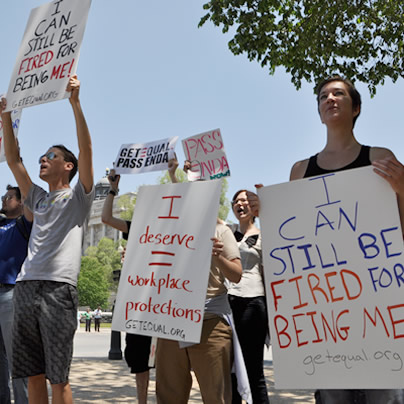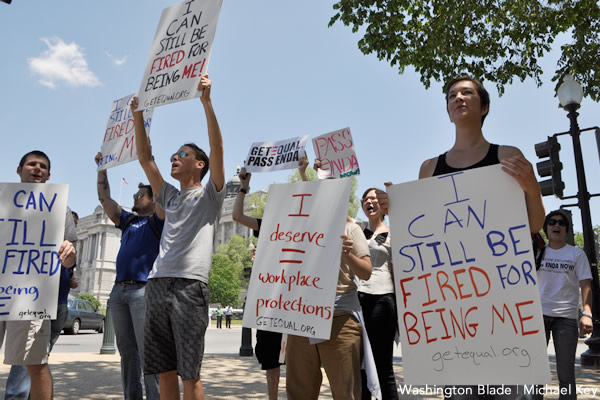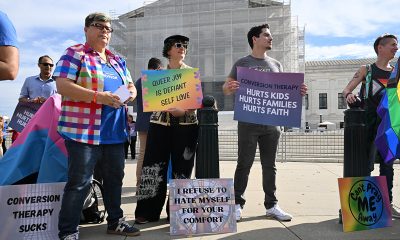Opinions
ENDA and the seduction of symbolic gestures
Achieving employment equality through legislation is illusory


Employment Non-Discrimination protest in May, 2010. (Washington Blade file photo by Michael Key)
Politicians are rarely catalysts for social change, serving instead as reflectors of shifts in public attitudes. That is the case with the Employment Non-Discrimination Act.
It is also the reason legislative passage would be largely symbolic and of limited practical value. In fact, the impotence of the effort is one reason it will at least – and again – partially advance through Congress. If seeking mostly meaningless grand gestures, this one is for you.
This actuality is far more fundamental than complaints regarding exemptions for the military and companies with fewer than 15 employees, as well as broad waivers for religious institutions and church corporations – including internal self-designation of secular jobs as exempt. It’s bigger than the fact that the legislation sensibly and explicitly prohibits preferential treatment, the institution of employment quotas and does not permit lawsuits claiming that facially neutral employment practices have an adverse, or disparate, impact in application or effect.
The popular perception is that ENDA is a magic solution to job-related discrimination. The reality is that its impact is negated by the vagaries of employment management and overshadowed by the widespread adoption of equality-embracing business practices. Approved this time or not, following two decades of defeats, doesn’t much matter other than as political theater.
Business concern that continued expansion of protected classes in private sector employment administration will result in a wave of hoop-jumping regulations and a bevy of frivolous lawsuits has significantly diminished over time. Not because those worries are unwarranted or indicative of animus toward gay, lesbian, bisexual or transgender workers. Rather, the now accumulated evidence is that it doesn’t much happen.
Andrew Sullivan noted this on the eve of Monday’s Senate cloture tally allowing a vote on the bill in the upper chamber this week. He reported that passage of the federal hate crimes law in 2009 has yielded exactly two successful anti-gay bias prosecutions. Statistics from the numerous municipalities and 21 states plus the District with sexual orientation employment protection laws – including 17 states and the District that include transgender workers – indicate there are few resulting lawsuits. The Government Accounting Office recently concurred.
For whatever reasons, these laws have produced scarce legal action.
Businesses understand the advantage in attracting and retaining talent best suited to build success. Fully 97 percent of Fortune 500 companies have instituted policies prohibiting anti-gay discrimination, with nearly 60 percent including gender identity. This reflects changing societal mores, more than the command of legislators. Fully four-in-five or more Americans believe that workplace discrimination is wrongheaded.
Equal treatment is now the widely implemented enterprise norm. Whether this development has been in some limited instances a result of reluctant acceptance is irrelevant, only underscoring the inability of government to ensure it in the nuanced arena of employment protocols.
Will there be more paperwork to complete and required cover-your-behind steps in hiring or firing? Will there be new human resource litigation-inoculation training to undergo? Will costly unfounded retaliatory claims by falsely aggrieved employees and applicants be instigated against employers honestly exercising the right to make employment decisions absent prejudice or violation of the law? Will pink-slip-chasing attorneys be beneficiaries? Yes, of course.
Are there a diminishing number of outlier employers who discriminate, including those doing so subtly and cleverly and escaping detection? Are there those who oppose LGBT employment protections because they dislike or even hate us? Who think our “behavior” immoral while masking bigotry utilizing a religious shield? Yep, there are.
However, statements by advocates that “every night, millions of LGBT workers go to sleep not knowing if they’ll have a job the next day” are silly and overblown. Hyperbolic claims diminish the situation some face and suggest a false remedy.
Changing attitudes and behavior through coercion, whether concerning big things or small matters and no matter how soothing a salve to the pain of history, is the easy and empty act. We need to remember that.
Mark Lee is a long-time entrepreneur and community business advocate. Follow on Twitter: @MarkLeeDC. Reach him at [email protected].
Opinions
Criteria for supporting a candidate in D.C.
We deserve statehood and mayoral control of our National Guard

Choosing a candidate to support for office in D.C. is a little different than choosing one in other places. As everyone knows, D.C. isn’t a state; though apparently not everyone understands what that means.
D.C. was granted home rule in 1974, but the legislation gave us only partial control of our government. Congress retained the right to review all legislation and budgets for 30 days. During that time, it can reject legislation fully or just make changes. Recently, Congress has used that power to turn down legislation when the Council revised our criminal code and screwed with legislation regarding how we tax our own residents. Congress has messed with our budgets as well. We saw what happened when the felon in the White House took control of the MPD for 30 days, allowed under the home rule legislation, and how he has full control over the D.C. National Guard and the implications that has had.
We have no representation in Congress, just a delegate. That person has been given a vote in committees when Democrats controlled the House, but even then, no vote in the full House. That all has severe implications for our elected officials. They must be aware of these things when they speak out, and when they propose and pass legislation. I personally saw that close up when we fought for marriage equality in the District. Those of us leading the charge worked with the Council on legislation to first recognize gay marriages from other states. Only after that legislation went through the review period without being stopped did the Council move to pass marriage equality in the District. Then we held our breath for the 30-day review period. There have been other instances where Congress stopped crucial legislation and put amendments onto our bills, like stopping us from spending certain money on needle exchange during the height of the AIDS crisis and stopping us from spending federal money on abortions.
So, when deciding who to support I want to be sure a candidate understands the implications if they attack Congress and the president, especially when Republicans are in charge. The fact is we have been screwed even by some Democrats. In today’s world, until we get rid of the felon, and Democrats take back both houses of Congress, all of our elected officials, but particularly our mayor, will be walking a tightrope. Beating your chest and attacking what they are doing is not the way to go. Again, we are not in the same position as cities like Portland, Minneapolis, or LA. We saw that again when the courts said the National Guard had to leave those cities, the president couldn’t send them in, but D.C. was exempt from that decision because he can send them here. The president, not the mayor, controls the National Guard in D.C.
Once I am comfortable a candidate understands all that, my criteria for supporting them of course includes many other things. I am a liberal, born in New York City. I taught public school in Harlem and was a member of the teacher’s union. Then went to work for progressive Congresswoman Bella S. Abzug (D-N.Y.). After that, I served as Coordinator of Local Government for the City of New York, during the time of the financial control board there. Then came to D.C. in 1978 to work for the Carter administration. I have been an activist all my life in the areas of civil rights, women’s rights, disability rights, and finally LGBTQ rights. I am a community and Democratic activist. All this impacts my decisions regarding candidates. I want to hear consistency from them. I don’t have a problem with people changing their mind on issues based on principle but do have a problem when it seems like they do so based on which way the wind is blowing. Like those who screamed ‘Defund the Police’ until the community they thought wanted to hear that in D.C. actually told them they wanted more police, not less. They simply wanted them better trained, held more accountable, and more community oriented.
I want a candidate to support statehood for D.C., but while fighting for that, they should speak out for budget and legislative autonomy. They must support mayoral control of the DC National Guard, and a full 4,000 member, well trained, MPD. They must understand how MPD works with federal law enforcement like the FBI, park police, capitol police, and the secret service. They need to reject working with ICE. They need to support more affordable housing, but not city owned housing, which has proven to be a failed experiment. They need to pledge to work to end homelessness providing decent, and available, shelters around the city for both individuals, and families in need. I want a strong education Mayor who supports teachers, and works to expand accountability for charter schools, holding them to the same standards as the public schools. We must have strong programs for both college bound students, and those who want another path, including internships and apprenticeships. Strong support for UDC, healthcare both affordable and available for all, and rental and food assistance when needed. There needs to be a strong focus on reducing the cost of childcare. A focus on the ARTS, libraries, and recreation centers, across all wards of the city. A focus on the environment, and affordable and accessible transportation. Of course, for me it’s a given they must support, and speak out, for the full panoply of rights for the LGBTQ community.
Looking at that list clearly means the city needs to raise the money to pay for all of it. Any candidate running for office who says they don’t support a strong, and vibrant, business sector, is either naïve, or just dumb, and will not have my support. A vibrant business community provides jobs, and in the long run the taxes that pay for the things we all want government to provide.
Once again D.C. is in a different place. We don’t collect taxes from those who work here but live in Maryland or Virginia. So, we have to be smart about the businesses we encourage to locate here and encourage them to hire D.C. residents, who then will pay taxes here. D.C. has developed a strong sports economy. That will be enhanced by the new RFK site, and includes the teams at the Capital Center, Audi Field, and Nats Stadium. Together they bring millions of people into D.C., who spend their money here. When groups like the Working Families Party, who suggest they are anti-business, endorse a candidate, I am wary of that candidate. We can’t be anti-business in D.C. I look at some candidates trying to replicate Mamdani’s victory in New York City by promising the moon. What they don’t seem to realize, or pretend not to, but voters must understand, is we in D.C., our Council and mayor, can’t promise what a New York City mayor does, hoping the governor and Albany, will help him out. In D.C. we don’t have an Albany to help us out. There is no governor coming to the rescue, it’s just us, and what we can negotiate with our Albany, which unfortunately consists of the president and Congress. Some may remember in 1995 we had the Control Board foisted on us. It was lucky at the time the president was a Democrat, Bill Clinton, and he named the board and chair, first Andrew Brimmer, and then the incredible Alice Rivlin. Can you imagine if Congress did that today who Trump would name to control our city?
So, we can’t only dump on them, and attack them, at least the mayor can’t, as she/he/they have to often ask them for help, and stave off their gratuitous attacks. As a columnist, and private citizen, I can attack the felon and his Republican sycophants in Congress all I want, I do and will continue to do so. But those we elect need to understand some constraint. The need to understand sometimes they are walking that tightrope when dealing with the White House and Congress.
I urge everyone to look closely at all the candidates, and then when you decide who you want, make sure you VOTE!
Peter Rosenstein is a longtime LGBTQ rights and Democratic Party activist.
Opinions
The global cost of Trump’s foreign aid ideology
Expanded global gag rule polices people’s identity

U.S. Vice President JD Vance on Jan. 23 announced the new Promoting Human Flourishing in Foreign Assistance Policy. This policy, which has nothing to do with flourishing, is part of the Trump administration’s effort to weaponize U.S. foreign assistance to enforce ideological conformity, to police people’s identity, and to suppress dissent — both at home and abroad.
One of the policy’s three pillars advances a discriminatory framework that denies transgender people’s existence and seeks to censor organizations that affirm transgender people and their rights.
The new policy expands the Mexico City Policy, also known as the global gag rule, which has restricted U.S. foreign aid to non-U.S. civil society organizations providing abortion care under every Republican administration since 1984. What is new — and unprecedented — is the expansion of this rights-restricting logic to efforts addressing gender identity and, more broadly, nondiscrimination efforts.
The new policy also applies to more categories of aid recipients, including multilateral organizations such as UN agencies.
With the expanded global gag rule, the Trump administration seeks to make transgender people invisible globally, as it has within the U.S. Whether it is threatening steep tariffs for countries that resist Trump’s appetite for Greenland, or withholding funds for organizations that refuse to toe the ideological line, the chilling message is clear: standing in the way of the administration’s political or ideological goals will come at a high cost.
Under this rule, organizations risk losing U.S. funding if their activities are seen to fall under the spurious concept of “gender ideology.” Organizations are not allowed to provide, refer for, or support access to gender-affirming care. Neither can they offer accurate information, counseling, or public-facing support for transgender people. The restrictions even apply to cultural activities such as “drag queen workshops, performances, or documentaries.”
Organizations that receive any foreign aid from the U.S. will need to censor themselves, even if their own national or regional laws enable — or oblige — them to speak up for human rights.
This new policy comes after the Trump administration dismantled the U.S. Agency for International Development, which has for decades provided the bulk of U.S. international development and humanitarian assistance.
To be clear, LGBT people, regardless of where they are, do not depend on the United States to organize, advocate, and stand up for their rights. And foreign aid is not the answer to undoing global inequity. But the sharp reversal of U.S. foreign policy will have wide-ranging consequences.
For years, protecting the rights of LGBT people had been a core tenet of the U.S. commitment to human rights. U.S. embassies often functioned as safe havens for human rights defenders in places where governments stoked homo- and transphobia for political gain. For LGBT people in the 65 countries that still criminalize same-sex intimacy, civil society-run clinics, supported with U.S. funds, became life-saving spaces — people could get HIV and other care there without fear of being turned away, ridiculed, or reported to the police.
Much of this is progress is now at risk. As a result of the U.S. funding cuts, organizations that directly provided health care and other services for LGBT people were forced to stop services abruptly, cutting off people’s access to chronic medication often without alternative care in place.
The impact extends beyond individual harm. Public health programs by definition are more likely to fail when stigma and fear are institutionalized. Transgender people are among the groups most at risk for ill health precisely because of discrimination and violence.
By prohibiting organizations, from local civil society groups to multilateral organizations like UNAIDS, from affirming transgender identities or addressing these underlying conditions, the expanded global gag rule actively undermines the foundations of effective public health programs.
Under the new and expanded gag rule, organizations face a terrible choice for accepting any U.S. funding. They can either self-censor and stop all work related to transgender people’s rights and needs. Or they forego U.S. funds and risk jeopardizing their organizational survival in an increasingly tough economic and funding climate.
This matters because civil society is one of the few effective counterweights to the global rise of populist and authoritarian governance. Alongside a coordinated global backlash against women’s and LGBT people’s rights are efforts to concentrate power, erode accountability, and close civic space.
Civil society organizations are crucial in exposing and resisting the authoritarian creep and in supporting marginalized groups. Gagging organizations into silence, or hollowing them out through funding cuts, accelerates civic space closure, and strengthens authoritarian governance.
Where the U.S. retreats and bullies, other countries and communities need to step up to offset the funding shortfalls and reduce organizations’ dependency on ideologically restricted U.S. foreign aid.
They need to support marginalized groups, increase funding for civil society groups, and commit funds to bolster multilateral mechanisms such as the Global Fund, which supports funding to combat HIV/AIDS, TB, and Malaria. They should clearly and consistently affirm everyone’s human rights, without exception.
Alex Muller is the director of Human Rights Watch’s LGBT Rights Program.
..

Renee Good. Alex Pretti.
During this last year, I wondered who would be the first U.S. citizen to be shot by our government. It was not a matter of if, but when. Always.
And now we know.
I thought it would be soldiers. But the masked men got there first. Because when you mix guns and protests, guns inevitably go off. The powers that be always knew it, hoped for it, and wanted it to happen.
Why? Because masked men and guns instill fear. And that’s the point. Ask yourself when’s the last time you saw masked men and guns in our cities, or anywhere for that matter. I always thought that men masked men with guns robbed banks. I was wrong.
Masked men want to rob us of our dignity as human beings. Of our assurance in the calmness and contentment of our communities. They want to rob us of our trust in our institutions, and our faith in each other. And truly they want to rob us of the happiness and joy that we all constantly yearn to find in our lives.
But our only collective ability as a nation to push back is our protests. Peaceful protests. As Renee and Alex did.
But peaceful protests? Because they are the perfect power to shame the cowardice of those that believe guns and force are the only true authority. Fortunately, our last hope and fiercest ally is our Constitution, which gives us the power — and the right — to protest.
How much more peaceful can you get when you hear Renee Good’s last words, “I’m not mad at you, Dude.” I may be mad at the system, the government, the powers of unknown people pulling the strings but not you personally. “Dude.” Peaceful to the last word.
Yet, what becomes lost in the frantic pace of hair-trigger news cycles, of officials declaring impetuous damnations alongside johnny-on-the spot podcasters spouting their split-second opinions are the two human beings who have lost their lives.
How habituated we’ve become as we instantly devour their instant obituaries. The sum of their lives declared in less than 10 seconds of cellphone video. They haven’t just lost their lives. They’ve lost all of their lives. And now we watch over and over again as their death is re-revealed, re-churned, re-evaluated, and re-consumed. In that endless repetition, we forget the meaning of life itself.
We must remember that Renee and Alex believed in their communities, in the purpose of their work, in the happiness of their loves and lives, and in the dignity and curiosity of life itself. They were singular individuals who did not deserve to die at the end of a gun barrel for any reason, ever.
How fitting that Renee was a poet. Sometimes in confronting the massiveness of loss in our lives, we look to our poetry and our psalms, our hymns and our lullabies, to find a moment of solace in our communal grief, and to remember Renee and Alex, for what they gave us in life.
Yet, at this moment, I cannot escape the reality of what was taken from them so soon, so violently and so forever. They were exceptionally courageous and normal people, and for that reason, I must remember them through a poem to explain to me, and others, the unexplainable.
I dream of this not happening.
I dream this day and night.
For none of this is real.
And none of this is right.
I dream of these sons and daughters
who now will not go home,
and dream of their mothers and fathers,
who now must stand alone.
I dream of all the flowers that they will never hold —
the kisses never shared again, the secrets to not be told.
I dream of all the sunsets that for them will never set,
I dream of all the love they gave and now they must forget.
I dream of all their dinners
with wine to never spill,
or books to read, or bread to break
or babies to be held.
I dream of each one still reaching
in the middle of the night,
for a hand that needs another
to stop a nightmare’s flight.
I dream of them not dreaming,
which I could never do,
for how can you not dream a dream
that never will come true.
I dream of this not happening.
I dream this day and night.
For none of this is real
And none of this is right.
Carew Papritz is the award-winning author of “The Legacy Letters,” who inspires kids to read through his “I Love to Read” and the “First-Ever Book Signing” YouTube series.




















